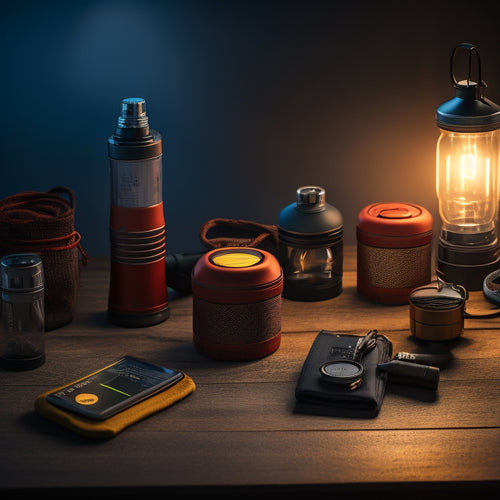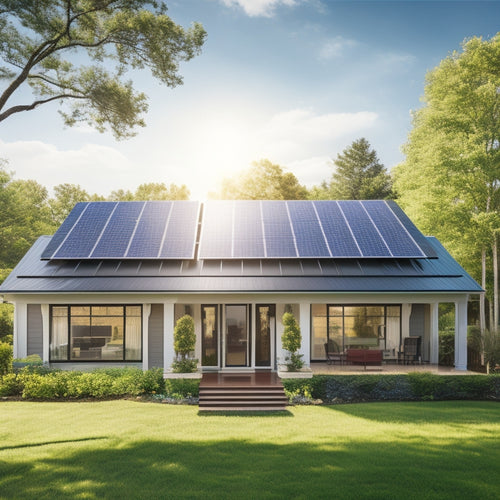
Top Solar Mounting Kits for Residential Installations
Share
When looking for top solar mounting kits for your residential installation, prioritize durability, weather resistance, and cost-effectiveness. Opt for kits made of corrosion-resistant materials like aluminum or galvanized steel to withstand harsh conditions. Guarantee compatibility with your roof type, whether it's asphalt shingles or metal, to maintain structural integrity. Consider systems that allow ideal panel positioning for maximum energy efficiency. Affordable DIY options often come with straightforward instructions, making installation accessible. Choosing the right kit not only protects your investment but also enhances energy independence. Uncover more about specific products that meet these criteria next!
At a Glance
- Versatile Options: Choose from roof-mounted, ground-mounted, or pole-mounted kits to best fit your residential space and energy needs.
- Durability Matters: Select high-quality kits with excellent wind resistance and snow load capabilities for reliability in extreme weather conditions.
- Material Quality: Opt for corrosion-resistant materials like aluminum or galvanized steel to ensure longevity and performance in varying climates.
- Compatibility Check: Ensure the mounting kit is compatible with your specific roof type for secure installation and optimal energy efficiency.
- DIY-Friendly: Many affordable options come with step-by-step instructions, allowing homeowners to save on labor costs and enhance their skills.
Durability in Harsh Weather
When selecting solar mounting kits, you need to take into account their ability to withstand extreme weather conditions. High-quality kits, designed with durable materials, are vital for guaranteeing that your solar panels remain securely attached even in harsh environments.
The quality of materials used plays a key role in securing long-term performance and reliability. By prioritizing durability, you can protect your investment and maintain peak energy production regardless of environmental challenges.
Additionally, professional inspections can help assess roof conditions and confirm proper installation techniques are followed.
Extreme Weather Resistance
Durability is essential for solar mounting kits, especially in regions prone to extreme weather conditions. When you invest in solar energy, you want your system to withstand harsh elements like heavy winds and snow loads.
High-quality mounting kits are designed to offer superior wind resistance, guaranteeing they remain secure even in gusty situations. Look for systems that have been tested against extreme wind speeds, as this can prevent costly damage and guarantee your panels stay in place.
Additionally, consider the snow load capabilities of the mounting kits. In snowy climates, the weight of accumulated snow can put significant strain on your solar panels.
A sturdy mounting system will distribute this load evenly, reducing the risk of bending or breaking.
Material Quality Considerations
Choosing the right materials for your solar mounting kit can greatly impact its performance in harsh weather conditions. You want components that can withstand extreme elements while ensuring the longevity of your investment.
Look for mounting kits made from materials with excellent corrosion resistance, like aluminum or galvanized steel. These materials will resist rust and degradation, even in coastal or humid environments, ensuring your system remains secure.
Additionally, consider how weight distribution affects the overall stability of your solar installation. A well-designed mounting kit will evenly distribute the weight of the solar panels across the structure, reducing stress on any single point.
This is essential during heavy winds or snow loads, where uneven weight can lead to damage or even failure.
Cost-Effective Installation Solutions
When considering solar mounting kits, you'll find several budget-friendly options that can greatly reduce your installation costs.
Properly evaluating key factors for grid-tie system design can further enhance your investment.
Opting for DIY installation not only saves you money but also gives you a hands-on role in your energy solution.
Budget-Friendly Options
Finding budget-friendly options for solar mounting kits can greatly reduce the overall cost of your residential solar installation. You don't have to compromise quality for affordability. Several affordable brands specialize in cost-effective mounting solutions that maintain performance and durability.
Look for kits that include all necessary components, as this can save you money on additional purchases.
When choosing a budget-friendly option, consider the material of the mounting system. Aluminum and galvanized steel are both lightweight and resistant to corrosion, offering longevity without breaking the bank.
Additionally, verify that the kit is compatible with your solar panels and roof type to avoid issues during installation.
Use these installation tips: always read the manufacturer's guidelines and double-check measurements before securing components. This can prevent costly mistakes and guarantee your system is installed correctly the first time.
DIY Installation Benefits
Opting for a DIY installation of your solar mounting kit can considerably enhance your cost savings while providing a sense of fulfillment. By taking on this project yourself, you not only save on labor costs but also gain significant hands-on experience with your solar system. This enabling allows you to feel more connected to your energy choices, giving you the freedom to control your home's energy production.
Here's a breakdown of the benefits of DIY installation:
| Benefit | Description |
|---|---|
| Cost Savings | Eliminate labor costs by doing it yourself. |
| Installation Ease | Many kits come with step-by-step instructions. |
| Skill Development | Gain practical skills in solar technology. |
| Homeowner Enablement | Take charge of your energy independence. |
With the right tools and guidance, you can achieve professional-level results. Plus, the satisfaction in successfully completing this project enhances your confidence and knowledge for future home improvements. Adopt the freedom that comes with a DIY approach, and watch your energy bills drop while elevating your home's sustainability.
Key Specifications Overview
When selecting a solar mounting kit for your residential installation, understanding the different types available is essential.
The choice of mounting hardware can greatly impact the overall energy efficiency of your system, as system performance can be influenced by factors such as panel orientation and tilt.
You'll also need to take into account the specific installation requirements to guarantee a secure and efficient setup.
Mounting Kit Types
In the domain of solar energy, selecting the right mounting kit is crucial for improving your residential installation. Understanding the various types of mounting kit innovations can greatly impact your system's efficiency and longevity.
There are primarily three types of mounting kits: roof-mounted, ground-mounted, and pole-mounted. Roof-mounted kits are ideal for those who want to make use of existing space without sacrificing aesthetics. They often include adjustable brackets that facilitate ideal solar panel alignment, maximizing sun exposure.
Ground-mounted kits, on the other hand, allow for greater flexibility in positioning and angle adjustments, making them suitable for properties with ample land. Finally, pole-mounted kits raise panels above obstacles, guaranteeing minimal shading and improved performance.
Each type comes with unique specifications, such as material strength, weight capacity, and installation complexity. Choosing the right one for your needs not only enhances your energy independence but also guarantees your solar investment pays off in the long run.
Installation Requirements
Choosing the right solar mounting kit is just the beginning; understanding the installation requirements guarantees that your system operates at peak performance. Adhering to the installation guidelines is essential for assuring both efficiency and safety. Consider the following key specifications:
| Specification | Description | Importance |
|---|---|---|
| Roof Type | Compatibility with flat or pitched roofs | Secures structural integrity |
| Load Capacity | Maximum weight the mount can support | Prevents failures |
| Wind Resistance | Ability to withstand local wind conditions | Enhances durability |
| Material Quality | Corrosion resistance and durability | Prolongs lifespan |
| Installation Angle | Ideal tilt for solar exposure | Maximizes energy efficiency |
Selecting Based on Roof Type
When choosing a solar mounting kit, it's essential to take into account your roof type, as it directly impacts installation and performance.
For asphalt shingles, you'll need specific mounts that prevent water infiltration, while metal roofs require solutions that guarantee a secure fit without compromising the roof's integrity.
Additionally, evaluating your roof type will help determine the most suitable mounting options to enhance energy harvesting and optimize efficiency.
Asphalt Shingle Considerations
Many homeowners overlook the importance of selecting the right solar mounting kit for asphalt shingle roofs, but it's vital for ensuring a secure and efficient installation.
When choosing a kit, you need to prioritize asphalt shingle compatibility. Not all mounting systems are designed to handle the unique characteristics of asphalt shingles, which can lead to installation challenges if the wrong kit is used.
Make sure the mounting brackets and hardware are compatible with your roof's structure. Some kits come with specialized flashing designed to prevent leaks, which is a key consideration for shingle roofing.
If you skip this step, you might face costly repairs down the road.
Additionally, consider the weight and load distribution of the solar panels. A sturdy mounting system won't only support the panels but also help mitigate potential damage to your shingles over time.
Metal Roof Solutions
Metal roofs offer unique advantages for solar installations, but selecting the right mounting solution is vital for maximizing efficiency and longevity. With metal roof benefits like durability, lightweight design, and excellent energy efficiency, these roofs provide a solid foundation for your solar panels.
However, the installation techniques you use can make or break your system's performance. When choosing a mounting solution, consider the type of metal roof you have—standing seam, corrugated, or flat.
Standing seam roofs allow for special clamps that secure panels without penetrating the roof, ensuring a watertight seal. For corrugated roofs, you'll need specific brackets that accommodate the ribbed structure, allowing for a secure fit and ideal tilt for sunlight absorption.
It's essential to work with professionals who understand these materials and techniques. Proper installation not only protects your home but also enhances the energy capture of your solar system.
Higher Energy Efficiency Ratings
When you optimize the positioning of your solar panels, you greatly enhance their energy efficiency ratings.
By ensuring that panels are angled correctly and placed in ideal locations, you maximize sunlight exposure throughout the day.
This not only improves performance but also translates to greater savings on your energy bills.
Enhanced Panel Positioning
Optimizing solar panel positioning is crucial for maximizing energy efficiency in residential installations. To achieve this, you need to employ effective panel alignment techniques that allow your solar panels to capture the most sunlight throughout the day. By adjusting the angle and direction of your panels, you can greatly enhance their performance.
One of the key factors in achieving this is determining the ideal tilt for your solar panels. The perfect tilt angle varies based on your geographical location and the specific time of year. By calculating this angle, you'll guarantee that your panels receive direct sunlight for the longest duration possible, which directly translates into higher energy output.
Additionally, consider the impact of shading from trees or nearby structures. Positioning your panels to avoid these obstructions can dramatically improve their efficiency.
Investing in high-quality solar mounting kits designed for flexibility in positioning won't only enhance your energy efficiency ratings but also give you the freedom to customize your setup.
In essence, taking the time to optimize your solar panel positioning through strategic alignment and tilt adjustments will pay off in the long run, providing you with energy independence and cost savings.
Frequently Asked Questions
What Tools Are Needed for Installing Solar Mounting Kits?
You'll need basic tools like a drill, level, and wrench for efficient installation techniques. Make sure you have appropriate mounting materials, guaranteeing stability and durability. Proper tools and materials enable you to utilize solar energy effectively.
How Do I Maintain Solar Mounting Kits Over Time?
Like a steadfast guardian, your solar mounting kits need care. Regularly inspect for debris, tighten connections, and monitor for rust. Implementing solar maintenance tips guarantees mounting longevity factors align, preserving your energy independence for years ahead.
Are Solar Mounting Kits Compatible With All Solar Panel Brands?
Not all solar mounting kits fit every solar panel brand. You'll need to check solar panel compatibility with specific mounting kit types to guarantee peak performance and secure installation, giving you the freedom to utilize solar energy effectively.
Can I Install Solar Mounting Kits on a Flat Roof?
When it comes to flat roofs, think of them as a canvas; each installation presents unique challenges. You can install solar mounting kits, but consider drainage, structural integrity, and other flat roof considerations for ideal performance.
What Warranties Are Typically Offered With Solar Mounting Kits?
When you consider solar mounting kits, warranties typically cover mounting materials and installation techniques. Most manufacturers offer limited warranties from 10 to 25 years, ensuring your investment remains secure and your energy independence thrives.
Explore More
In choosing the right solar mounting kit for your home, durability and efficiency are paramount. Did you know that homes equipped with high-quality solar mounting systems can increase energy efficiency by up to 20%? By selecting a kit designed for your roof type and understanding the specifications, you're not just investing in solar panels—you're securing long-term savings and performance. Make an informed choice, and watch your energy bills drop while contributing to a sustainable future.
Related Posts
-

Best Solar Powered Flashlights for Emergency Situations
When you're choosing the best solar-powered flashlights for emergency situations, focus on their brightness, battery ...
-

Home Solar Installation Cost
You're considering installing solar panels on your home, and the upfront cost is likely the biggest hurdle standing i...
-

High-Efficiency Solar Battery Chargers for Remote Areas
High-efficiency solar battery chargers are essential for your off-grid energy needs in remote areas. They maximize en...


